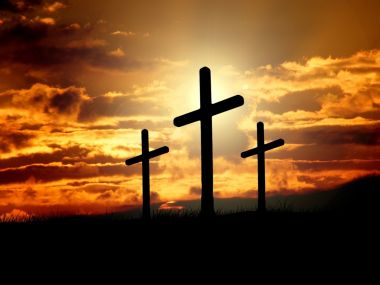May the dying cry of the God who made you be a source of healing love

The cross represents for me the fulcrum of forgiveness at the heart of history. It is the one place the abused and the abuser both can come: the one to forgive, the other to be forgiven. Because of this it is the place that I can come, for the abuser and the abused in me to find their healing.
Having been wounded in a number of ways as a child, I gladly came to the cross as a place of consolation. God embraced me there; loved me in a way others had struggled to deliver. I could envisage the harm done to me transferred, instead, onto the broken figure of the Messiah. A burden was lifted. Love healed me, and I was able to forgive. Imagine my surprise, then, as I grew in Christ and discovered that I was the abuser. Not in the same ways I had been abused, but in my selfishness; my inability to love; my insensitivity to the needs of those around me. The victim parking area at Calvary is a short-term zone. You're allowed to be in it for a while, but in due course you have to move on.
The beauty of Good Friday is that the place God brought me to show me his love; to embrace and heal me, was the same place he brought me to knock the selfishness out of me. The God who called me beautiful was unafraid to name me broken, and the answer offered to me was to drink from the same strange fountain.
This works because the dynamics of the cross are stark and simple. The perfect Son of God, the one being in the universe who can claim to be beautiful but not broken, who deserves no reprimand, accepts in his own body the full impact of our brokeness. From cruelty to pollution, from acts of rape to acts of simple self-indulgence, all of it falls on him. And because it falls on him, it no longer weighs on us, neither the criminals who stand before him nor the victims of their crimes.
One of my sons, as a toddler, had an unbreakable attachment to baby bottles. We tried every strategy we could think of to get him to drink from a cup, but nothing worked. He just kept crying for the old ways: even when we explained what growing up was all about and he agreed it was a generally good idea, he still couldn't bear life without his bottle. Until my wife had a brainwave. We took our boy to a bridge over the river Avon in the very centre of Bath, and let him watch as we threw his bottles in the river. I know, it was an irresponsible act of littering - but there was a higher purpose at work. He watched the bottles float away. He saw them go. He cried a little, but he never asked for them again. Telling him the bottles were no more didn't do it. Showing him where they went did.
Is these too naive a picture of the cross? That it exists to show us where the pain goes - the pain we inflict and the pain we endure?
Don't be surprised, as you come before the cross to ask forgiveness for your failings, to find yourself in company with those you have let down. And don't be shocked, when you come here for healing, to see the one who hurt you in the crowd. They're both here, because there's nowhere else for either one to go.
May the dying cry of the God who made you be to you a source of healing love.
May you know that he has carried, in his body, every bruise that you have suffered.
May he give you courage to admit that you are broken, as you see poured out on him pains you have caused.
And may you find with all the shattered fragments of humanity,
Offender and offended, abuser and abused,
That at this cross is where you need to be
For here, and here alone, is life and freedom.
Based in Normandy, France, Gerard Kelly co-leads, with his wife Chrissie The Bless Network, a missions movement committed to renewal across mainland Europe. Gerard's book The Prodigal Evangelical is out now.











